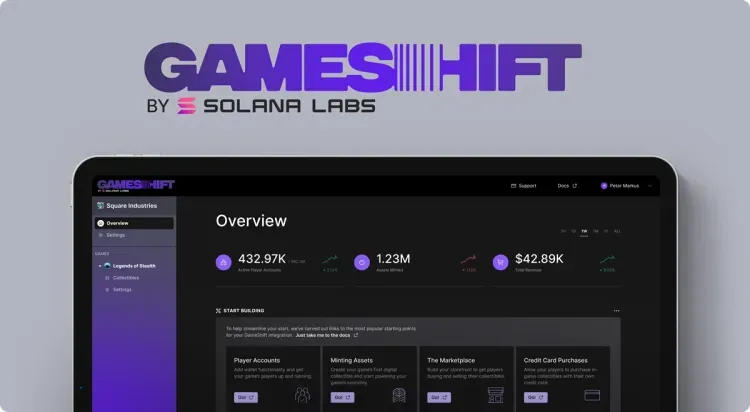Play Solana has taken another step in its web3 gaming strategy with the introduction of SuperHUB, a new platform that ties together games, wallets, digital identity, and decentralized finance. The announcement, made on October 2, comes shortly before the company’s PSG1 handheld console ships on October 6 and the launch of its $PLAY token on October 13.
Play Solana Reveals SuperHUB
SuperHUB is designed to act as more than just another app or launcher. The platform is meant to connect different parts of the web3 experience under one system, combining hardware, digital tools, and community-driven content. Instead of requiring players to juggle multiple apps or wallets, Play Solana’s system brings gaming, financial tools, and identity features into a single connected layer.
The company has described SuperHUB as a distribution engine for blockchain gaming, emphasizing its ability to deliver games, rewards, and community features in one place. By centralizing these services, Play Solana hopes to make onboarding easier for newcomers while improving the long-term experience for existing players.

Play Solana Reveals SuperHUB
4.9 Million Daily Active Wallets
Blockchain-based games have grown in number, but they have yet to capture a wide mainstream audience. Play Solana points to data from May 2025 showing around 4.9 million daily active wallets connected to web3 gaming. While that number sounds significant, it represents less than one percent of the total crypto wallets in existence and doesn’t always translate into active players.
For comparison, traditional gaming platforms see much higher levels of engagement. Roblox reports more than 112 million daily active users, and Steam sees over 69 million. Play Solana argues that web3 gaming’s limited appeal comes down to a few key issues: confusing onboarding processes, a lack of focus on fun over financial gain, fragmented platforms, and the absence of dedicated gaming hardware.

Play Solana Reveals SuperHUB
SuperHUB Ecosystem and PSG1
A central part of the SuperHUB ecosystem is the Play Solana Gen1, or PSG1, a handheld console that begins shipping October 6. The console is built with modern hardware, including an octa-core ARM processor, 8 GB of RAM, and 128 GB of storage, and supports WiFi 6.0 and Bluetooth 5.4. It also includes a fingerprint scanner for security.
Unlike traditional handhelds, the PSG1 doubles as a hardware wallet through a system called SvalGuard. It runs on EchOS, a custom version of Android built for gaming, which allows users to access games, DeFi apps, and crypto storage from the same device. The console is priced at $329 for the standard version, with themed editions like Pudgy Penguins and BONK priced slightly higher.

Play Solana Reveals SuperHUB
Games and Community Features
SuperHUB’s library includes both original and third-party titles. Among them is Play Solana: Origins, which is designed to introduce players to staking, token swaps, and NFTs through gameplay rather than technical tutorials. Community-driven projects such as BONK Arena also highlight how token-based ecosystems can evolve into full-fledged games for the platform.
Progress and identity are tracked through PlayDex and PlayID, two core features of the SuperHUB ecosystem. PlayDex offers events, staking options, and leaderboards, while PlayID serves as a digital identity layer that connects achievements, governance, and rewards across devices. NFTs such as Player1 and Player2 act as dynamic profile pictures tied directly to player progress and activity.

Play Solana Reveals SuperHUB
DeFi, $PLAY Token, and PlayBadges
One of the more notable aspects of SuperHUB is its built-in DeFi integration. Instead of requiring players to download separate wallets or extensions, the system includes financial features as part of the core experience. This is supported through a partnership with Jupiter Mobile Wallet, allowing users to stake, swap, and manage rewards directly from the PSG1 console.
The next major milestone for Play Solana is the launch of its $PLAY token on October 13. While full token details have yet to be shared, players can already earn XP in preparation for the airdrop. PlayBadges, introduced earlier this month, allow NFT communities such as DeGods to participate in the ecosystem, although badges are not required to begin earning XP.
XP can be accumulated by completing tasks on PlayDex, such as connecting wallets or joining community channels, and rankings will determine how tokens are distributed once the airdrop begins.
Looking Ahead
With SuperHUB, the PSG1 console, and the upcoming $PLAY token, Play Solana is attempting to provide a more complete foundation for web3 gaming. By combining hardware, financial tools, and digital identity into one system, the company aims to simplify the experience for players and build long-term engagement in a space that has often struggled to retain users.
Frequently Asked Questions (FAQs)
What is Play Solana’s SuperHUB? SuperHUB is a connected platform that combines web3 gaming, wallets, digital identity, and DeFi tools into a single system designed to make blockchain gaming more accessible.
When does the PSG1 console ship? The PSG1 handheld console begins shipping on October 6, 2025.
How much does the PSG1 cost? The standard version of the PSG1 is priced at $329, while special editions such as Pudgy Penguins or BONK-themed models are priced at $349.
What is the $PLAY token? $PLAY is the native token of Play Solana’s ecosystem, launching on October 13, 2025. Players can earn XP through PlayDex to qualify for the token airdrop.
Do I need a PlayBadge to earn XP? No, PlayBadges are optional. Players can earn XP for the $PLAY token airdrop by completing tasks and social actions on PlayDex.



